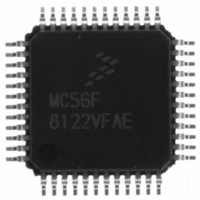MC56F8122VFAE Freescale Semiconductor, MC56F8122VFAE Datasheet - Page 11

MC56F8122VFAE
Manufacturer Part Number
MC56F8122VFAE
Description
IC DSP 16BIT 40MHZ 48-LQFP
Manufacturer
Freescale Semiconductor
Series
56F8xxxr
Datasheet
1.MC56F8122VFAE.pdf
(136 pages)
Specifications of MC56F8122VFAE
Core Processor
56800
Core Size
16-Bit
Speed
40MHz
Connectivity
SCI, SPI
Peripherals
POR, WDT
Number Of I /o
21
Program Memory Size
32KB (16K x 16)
Program Memory Type
FLASH
Ram Size
4K x 16
Voltage - Supply (vcc/vdd)
2.25 V ~ 3.6 V
Data Converters
A/D 6x12b
Oscillator Type
Internal
Operating Temperature
-40°C ~ 105°C
Package / Case
48-LQFP
Data Bus Width
16 bit
Processor Series
MC56F81xx
Core
56800E
Maximum Clock Frequency
40 MHz
Number Of Programmable I/os
21
Data Ram Size
8 KB
Operating Supply Voltage
- 0.3 V to + 4 V
Maximum Operating Temperature
+ 105 C
Mounting Style
SMD/SMT
Data Rom Size
8 KB
Minimum Operating Temperature
- 40 C
Lead Free Status / RoHS Status
Lead free / RoHS Compliant
Eeprom Size
-
Lead Free Status / Rohs Status
Lead free / RoHS Compliant
Available stocks
Company
Part Number
Manufacturer
Quantity
Price
Company:
Part Number:
MC56F8122VFAE
Manufacturer:
Freescale Semiconductor
Quantity:
10 000
Architecture Block Diagram
1.4 Architecture Block Diagram
Note: Features in italics are NOT available in the 56F8122 device and are shaded in the following figures.
The 56F8322/56F8122 architecture is shown in
Figure 1-1
and
Figure
1-2.
Figure 1-1
illustrates how the
56800E system buses communicate with internal memories and the IPBus Bridge.
Table 1-2
lists the
internal buses in the 56800E architecture and provides a brief description of their function.
Figure 1-2
shows the peripherals and control blocks connected to the IPBus Bridge. The figures do not show the
on-board regulator and power and ground signals. They also do not show the multiplexing between
peripherals or the dedicated GPIOs. Please see
Part 2 Signal/Connection
Descriptions, to see which
signals are multiplexed with those of other peripherals.
Also shown in
Figure 1-2
are connections between the PWM, Timer C and ADC blocks. These
connections allow the PWM and/or Timer C to control the timing of the start of ADC conversions. The
Timer C, Channel 2, output can generate periodic start (SYNC) signals to the ADC to start its conversions.
In another operating mode, the PWM load interrupt (SYNC output) signal is routed internally to the Timer
C, Channel 2, input as indicated. The timer can then be used to introduce a controllable delay before
generating its output signal. The timer output then triggers the ADC. To fully understand this interaction,
please see the 56F8300 Peripheral User Manual for clarification on the operation of all three of these
peripherals.
56F8322 Technical Data, Rev. 16
Freescale Semiconductor
11
Preliminary











